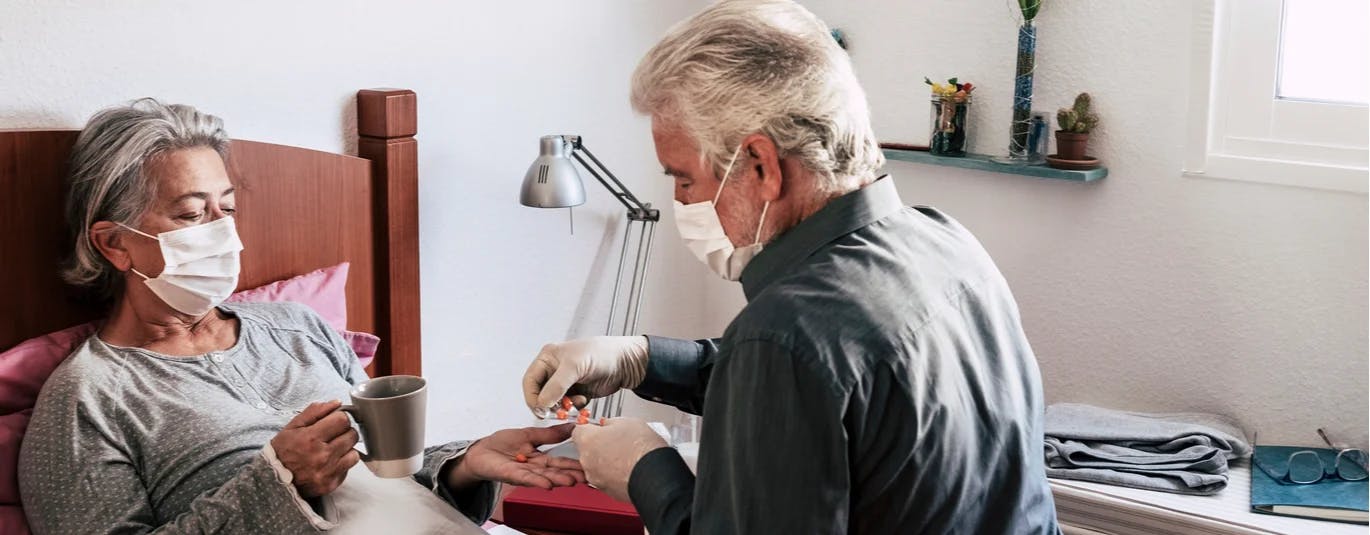
FIND OUT HOW TO CARE FOR A LOVED ONE WITH COVID-19 WHILE KEEPING YOURSELF SAFE.
Undoubtedly, everyone has developed new skills or taken on new responsibilities since the pandemic began. Some parents have become teachers. Some people have mastered online grocery shopping. Many have done both while also taking on the role of a caregiver for a loved one who has been sick with COVID-19. In fact, according to a recent Health of America report, 55% of current caregivers would not have identified as caregivers before COVID-19. And 61% of Americans are worried about caring for a friend, neighbor or family member with COVID-19.[1]We understand. Caring for someone who has COVID-19 comes with many challenges. How do you stay healthy while caring for someone with a highly contagious virus? Here are some tips to keep in mind.
Tips to Care for Your Loved One
1. Determine a Quarantine Area:
Also called a sick room, this space should be reserved for someone diagnosed with COVID-19. All others should occupy this space as little as possible.[2] Make sure your loved one is comfortable. Ensure that the space has a bed and necessary items to aid their recovery.
2. Cover Basic Needs:
When someone is sick with COVID-19, the best thing they can do is get plenty of rest and drink lots of fluids.[3] Ensure the person you care for has the supplies needed to do just that. By picking up over-the-counter medications and groceries, you can help them follow the doctor’s instructions for care.
3. Help Track Symptoms and Know the Warning Signs
COVID-19 symptoms can progress quickly, so it’s important to observe if your loved one is getting sicker. Any signs of difficulty breathing, persistent chest pain, inability to wake up, or bluish lips or face are all signs that emergency medical care may be needed. Have the doctor’s phone number handy. Be ready to call your physician or 911 if symptoms get severe.[4]
A timeline of COVID-19 symptoms
While everyone experiences illness differently, researchers and physicians have seen some trends in the course of disease for COVID-19. From initial symptoms to recovery, this timeline can help you know what to expect if you or a loved one tests positive for the virus.
Review the course of COVID-19 symptoms
Tips to Take Care of Yourself
The CDC has tips for caring for someone with COVID-19.
1. Limit Contact When Possible:
While it’s important to care for your loved one, you must also protect yourself. One of the best ways to do that is to remain socially distant. You’ll inevitably encounter your loved one. But when you do, make sure you are wearing a face covering. Wear protective gloves when handling items your loved one has touched. This is the best way to reduce your exposure.
2. Keep Items Separate:
When someone is sick, the fewer items you can share, the better. Try to keep all personal items separate, including phone chargers, remote controls, and dishes.
3. Clean, Clean, Clean:
Areas that are highly occupied should be cleaned daily. This includes countertops, doorknobs, bathrooms, and light switches. An everyday home disinfectant should work as a cleaning product.
4. Track Your Health:
Keep tabs on your own health while caring for your loved one. If you begin to show symptoms, contact your primary care doctor and set up a virtual appointment via video or over the phone.
5. Stay Home:
While you may not have a COVID-19 diagnosis, your chance of exposure is high. That means you could be contagious even if you aren’t experiencing symptoms. Keep others safe by staying home until you and your loved one are symptom-free and test negative.
Caring for a loved one always comes with challenges, but COVID-19 has magnified them. For more information and tips on staying safe while providing care, visit the Centers for Disease Control and Prevention website. If you need help accessing care, visit our COVID-19 resources page.
Interested in learning more about health insurance? On this page, you can get a free online quote or contact the Health Plans of NC Independent Agent.
Ready to get started?
Related Articles

What To Do If You Have Symptoms Of COVID-19
During a time with so many unknowns, knowing what to do if you think you have COVID-19 can be challenging. If you’re experiencing symptoms – such as trouble breathing, cough, fever or chills, sore throat, headache, body aches, nausea, vomiting, loss of taste or diarrhea – you should take the following steps.
1. Call your doctor.
Blue Cross NC

Reimbursement Available For Over-The-Counter Covid-19 Rapid Tests
Health Plans of NC, Kelly Quinn

Pregnant? Here's What You Need To Know About COVID-19
Welcoming a new baby is a joyous time. You look forward to decorating the nursery, shopping for baby items and meeting your little one. But with the coronavirus outbreak, many new and expecting families are now experiencing worry.
Here are answers to questions new and expecting families may have right now.
Blue Cross NC